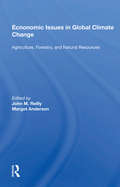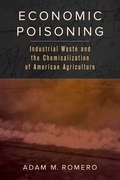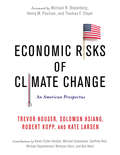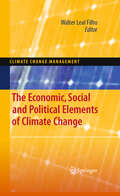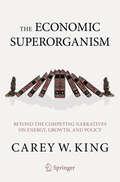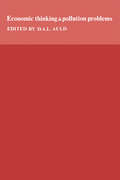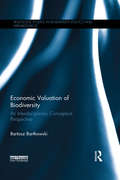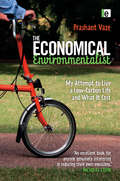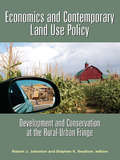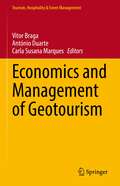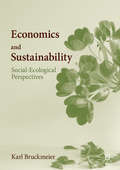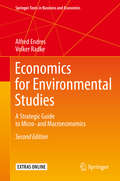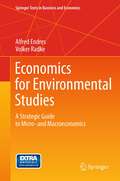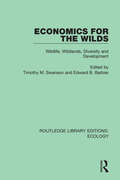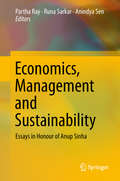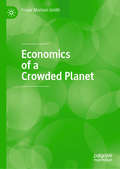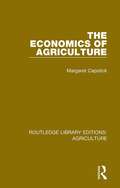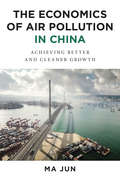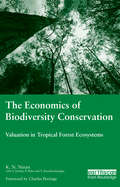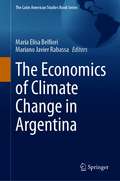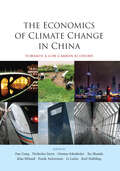- Table View
- List View
Economic Issues In Global Climate Change: Agriculture, Forestry, And Natural Resources
by John M. Reilly Margot AndersonThis book provides a snapshot on economic thinking about global change and provides a starting point for researchers for evaluating the economics of global change in the context of agriculture, forestry, and resource issues. It attempts to rectify the scarcity of economic analysis in global change.
Economic Poisoning: Industrial Waste and the Chemicalization of American Agriculture (Critical Environments: Nature, Science, and Politics #8)
by Adam M. RomeroThe toxicity of pesticides to the environment and humans is often framed as an unfortunate effect of their benefits to agricultural production. In Economic Poisoning, Adam M. Romero upends this narrative and provides a fascinating new history of pesticides in American industrial agriculture prior to World War II. Through impeccable archival research, Romero reveals the ways in which late nineteenth- and early twentieth-century American agriculture, especially in California, functioned less as a market for novel pest-killing chemical products and more as a sink for the accumulating toxic wastes of mining, oil production, and chemical manufacturing. Connecting farming ecosystems to technology and the economy, Romero provides an intriguing reconceptualization of pesticides that forces readers to rethink assumptions about food, industry, and the relationship between human and nonhuman environments.
Economic Risks of Climate Change
by Michael R. Bloomberg Solomon Hsiang Robert Kopp Trevor Houser Kate LarsenClimate change threatens the economy of the United States through increased flooding and storm damage, climate-driven changes in crop yields, disruptions in labor productivity, crime, and public health and heat-related strains on energy systems. Combining current data with state-of-the-art climate models, econometric research on human responses to climate, and cutting-edge private sector risk assessment tools, this prospectus crafts a game-changing analysis of the risks of future climate change in specific U.S. regions and sectors.This work is based on a critically acclaimed independent assessment of climate change's economic risks commissioned by the Risky Business Project. With contributions from Karen Fisher-Vanden (Penn State University), Michael Greenstone (MIT), Geoffrey Heal (Columbia Business School), Michael Oppenheimer (Princeton University), and Nicholas Stern and Bob Ward (Grantham Research Institute), as well as a foreword from the nation's leading voices on environmental action, the prospectus speaks to scientists, researchers, scholars, activists, and policymakers. It depicts the distribution of escalating climate change risk across the country and anticipates its effects on aspects as varied as coastal property and crime. Beautifully illustrated and accessibly written, Economic Risks of Climate Change is an essential tool for helping businesses and governments prepare for the future.
Economic Risks of Climate Change: An American Prospectus
by Trevor Houser Solomon Hsiang Robert Kopp Kate Larsen Michael Delgado Amir Jina Michael Mastrandrea Shashank Mohan Robert Muir-Wood D. J. Rasmussen James Rising Paul WilsonClimate change threatens the economy of the United States in myriad ways, including increased flooding and storm damage, altered crop yields, lost labor productivity, higher crime, reshaped public-health patterns, and strained energy systems, among many other effects. Combining the latest climate models, state-of-the-art econometric research on human responses to climate, and cutting-edge private-sector risk-assessment tools, Economic Risks of Climate Change: An American Prospectus crafts a game-changing profile of the economic risks of climate change in the United States.This prospectus is based on a critically acclaimed independent assessment of the economic risks posed by climate change commissioned by the Risky Business Project. With new contributions from Karen Fisher-Vanden, Michael Greenstone, Geoffrey Heal, Michael Oppenheimer, and Nicholas Stern and Bob Ward, as well as a foreword from Risky Business cochairs Michael Bloomberg, Henry Paulson, and Thomas Steyer, the book speaks to scientists, researchers, scholars, activists, and policy makers. It depicts the distribution of escalating climate-change risk across the country and assesses its effects on aspects of the economy as varied as hurricane damages and violent crime. Beautifully illustrated and accessibly written, this book is an essential tool for helping businesses and governments prepare for the future.
The Economic, Social and Political Elements of Climate Change
by Walter Leal FilhoA unique feature of this book is its strong practice-oriented nature: it contains a wide range of papers dealing with the social, economic and political aspects of climate change, exemplifying the diversity of approaches to climate change management taking place all over the world, in a way never seen before. In addition, the book describes a number of projects and other initiatives happening in Africa, Asia, Europe, Latin American and the Australasian region, providing a profile of the diversity of works taking place today.
The Economic Superorganism: Beyond the Competing Narratives on Energy, Growth, and Policy
by Carey W. KingEnergy drives the economy, economics informs policy, and policy affects social outcomes. Since the oil crises of the 1970s, pundits have debated the validity of this sequence, but most economists and politicians still ignore it. Thus, they delude the public about the underlying influence of energy costs and constraints on economic policies that address such pressing contemporary issues as income inequality, growth, debt, and climate change. To understand why, Carey King explores the scientific and rhetorical basis of the competing narratives both within and between energy technology and economics. Energy and economic discourse seems to mirror Newton’s 3rd Law of Motion: For every narrative there is an equal and opposite counter-narrative. The competing energy narratives pit "drill, baby, drill!" against renewable technologies such as wind and solar. Both claim to provide secure, reliable, clean, and affordable energy to support economic growth with the most benefit to society, but how? To answer this question, we need to understand the competing economic narratives, techno-optimism and techno-realism. Techno-optimism claims that innovation overcomes any physical resource constraints and enables the social outcomes and economic growth we desire. Techno-realism, in contrast, states that no matter what energy technologies we use, feedbacks from physical growth on a finite planet constrain economic growth and create an uneven distribution of social impacts. In The Economic Superorganism, you will discover stories, data, science, and philosophy to guide you through the arguments from competing narratives on energy, growth, and policy. You will be able to distinguish the technically possible from the socially viable, and understand how our future depends on this distinction.
Economic Thinking and Pollution Problems
by Douglas AuldThe purpose of this collection is to provide the student with an introduction to the way in which the discipline of economics tackles the problems posed in affluent societies by their various 'waste' products. 'Pollution economics' introduces a student to aspects of price economics, public finance, and political economy in relation to a pressing and complex public concern. The work includes a number of Canadian statements on pollution and its control in this country, and gives the text of two recent pieces of legislation on the topic. The selections in this volume present a wide variety of opinions, ideas, and facts about the economic dimension of the ecological crisis. Pollution costs money--pollution abatement also costs money and these costs will have to be paid somehow by some people. The contributors--politicians, businessmen, and professors--explore the problem of pollution and its control as each sees it, and the volume as a whole should help encourage a greater awareness both of economics as a way of thinking and of the difficulties in making the right public policies.
Economic Valuation of Biodiversity: An Interdisciplinary Conceptual Perspective (Routledge Studies in Biodiversity Politics and Management)
by Bartosz BartkowskiWhile biodiversity loss is an ecological phenomenon, it also has further dimensions – political, social and, last but not least, economic. From the economic perspective, the rapid loss of biological diversity can be viewed in two ways. First, the consequence of this deterioration process is a loss of options and an increase in scarcity of the environmental ‘good’, biodiversity. Second, economic activity and the structure of global and local economic institutions have frequently been identified as the major drivers of biodiversity loss. In economic terms, this constitutes a market failure – market-based economic activities lead to processes which undermine the long-term stability of these very activities. This book provides an ecological economic perspective on the value of diversity in ecosystems. Combining insights from various sub-disciplines of ecology and environmental/ecological economics, the author constructs a conceptual framework which identifies the ways in which biodiversity influences human well-being and offers a novel, unifying perspective on the economic value of biodiversity. This framework demonstrates that biodiversity’s economic value mainly results from uncertainty about the future, regarding both supply of and demand for ecosystem services, and interconnections between ecosystems. The book goes on to identify suitable methods for economic valuation of biodiversity and discusses the currently underdeveloped and underused approach of deliberative monetary valuation. Combining a strong theoretical framework with practical examples, this book will be of great interest to students and researchers of ecological economics, ecosystem services, environmental values and environmental and resource economics.
The Economical Environmentalist: My Attempt to Live a Low-Carbon Life and What it Cost
by Prashant VazeReducing your carbon emissions in an economic down-turn can be challenging, but saving the planet doesn't have to cost you more. Tough economic times need not relegate concerns for the planet to the back burner. The author is an environmental economist trying to live a low-carbon life in London. He worked for 15 years in the UK's Office of Climate Change, the Prime Minister's Strategy Unit and the Department of the Environment. So far so good. But he has kids. A family to visit in India. A hectic job. In distilling and building on his own experience of trying to live a low carbon life, he helps us navigate the choices that confront us all - families, singletons, pensioners - when making decisions about what to eat, what to buy, how to travel and how to keep warm in the era of climate change and economic turmoil. He works out the sums and lets us know which choices will make the biggest difference, and which are false savings. His book is an irreverent but seriously rigorous reference guide to low-cost, low-carbon living for everyone - in any location - in tough times. It's brimming with up-to-date information on current and future technologies, tips and ideas for every budget on how to spend the least for the biggest carbon reduction gain and insight from the experiences of people trying to live low-carbon lives.
Economics and Contemporary Land Use Policy: Development and Conservation at the Rural-Urban Fringe
by Robert J. Johnston Stephen K. SwallowAs external forces increase the demand for land conversion, communities are increasingly open to policies that encourage conservation of farm and forest lands. This interest in conservation notwithstanding, the consequences of land-use policy and the drivers of land conversions are often unclear. One of the first books to deal exclusively with the economics of rural-urban sprawl, Economics and Contemporary Land-Use Policy explores the causes and consequences of rapidly accelerating land conversions in urban-fringe areas, as well as implications for effective policy responses. This book emphasizes the critical role of both spatial and economic-ecological interactions in contemporary land use, and the importance of a practical, policy-oriented perspective. Chapters illustrate an interaction of conceptual, theoretical, and empirical approaches to land-use policy and highlight advances in policy-oriented economics associated with the conservation and development of urban-fringe land. Issues addressed include (1) the appropriate role of economics in land-use policy, (2) forecasting and management of land conversion, (3) interactions among land use, property values, and local taxes, and (4) relationships among rural amenities, rural character, and urban-fringe land-use policy. Economics and Contemporary Land-Use Policy is a timely and relevant contribution to the land-use policy debate and will prove an essential reference for policymakers at the local, state, and federal levels. It will also be of interest to students, academics, and anyone with an interest in the practical application of economics to land-use issues.
Economics and Management of Geotourism (Tourism, Hospitality & Event Management)
by Vitor Braga Carla Susana Marques António DuarteThis book covers all aspects of the economics and management of geotourism, an increasingly important sector of nature tourism that focuses on the geology and landscape of different territories, providing a pleasurable and educational tourist experience. Geotourism is a sustainable form of tourism that has the potential to deliver significant benefits to host communities. To date, however, geotourism has been examined primarily from the natural sciences perspective, to the detriment of issues related to local social and economic impacts, inter-organizational collaboration, tourist responses, and community participation. This book therefore fills a major gap in the literature. While a key focus is the impacts of geotourism on economic and social development processes and the quality of life of local populations, detailed attention is also devoted to topics such as geopark and geosystem management, innovative and entrepreneurial strategies in geotourism, and territorial marketing. In addition, readers will gain a clear understanding of the extent to which the opportunities and challenges facing geotourism reflect current trends in the tourist industry as a whole.
Economics and Sustainability: Social-Ecological Perspectives
by Karl BruckmeierThis textbook provides an overview of economic perspectives on sustainability. It synthesises economic, ecological and interdisciplinary sustainability research and by applying an integrated social-ecological and economic framework, demonstrates how this research can be improved and implemented in practice. Split into three parts, the book begins by introducing a range of topics forming the basis of knowledge needed to understand the varying sustainability discourses in economics, ecology and interdisciplinary sustainability research. Chapters cover the political context of sustainability; the history of sustainability in European environmental discourses dating back to the seventeenth century; as well as various problems and forms of interdisciplinary knowledge integration and synthesis in the sustainability process. Part II reviews the core economic themes relevant to sustainable development including natural resource management, environmental economics and ecological economics. Also highlighted are often neglected issues such as conflicts, disasters and interrelated crises on the way towards sustainability. The chapters in Part III discuss the future of the sustainability process. They argue for the necessity of overhauling the relationship between science and practice; explore failures and the unforeseen difficulties of sustainability transformation; and discuss how to enable a long term sustainability process that reaches into the distant future.An innovative resource for a broad range of interdisciplinary programmes on sustainability. The book will be an invaluable reference for master and PhD students, instructors, researchers and practitioners in sustainability governance.
Economics and the Challenge of Global Warming
by Charles S. PearsonEconomics and the Challenge of Global Warming is a balanced and comprehensive analysis of the role of economics in confronting global warming, the central environmental issue of the twenty-first century. It avoids a technical exposition in order to reach a wide audience and is up to date in its theoretical and empirical underpinnings. It is addressed to all who have some knowledge of economic concepts and a serious interest in how economics can (and cannot) help in crafting climate policy. The book is organized around three central questions. First, can benefit-cost analysis guide us in setting warming targets? Second, what strategies and policies are cost-effective? Third, and most difficult, can a global agreement be forged between rich and poor, North and South? While economic concepts are foremost in the analysis, they are placed within an accessible ethical and political matrix. The book serves as a primer for the post-Kyoto era.
Economics for Environmental Studies: A Strategic Guide to Micro- and Macroeconomics (Springer Texts in Business and Economics)
by Alfred Endres Volker RadkeThis textbook provides a concise introduction to micro- and macroeconomics and demonstrates how economic tools and approaches can be used to analyze environmental issues. Written in an accessible style without compromising depth of the analysis, central issues in the public policy debate on environmental problems and environmental policy are discussed and analyzed from an economics perspective. The book is meant as an introductory (and in some parts intermediate) text for undergraduate students in environmental sciences without a background in economics. It also serves as a companion for economists interested in a presentation of the micro and macro foundations of environmental economics, in a nutshell.The second edition has been revised, updated and extended in may ways, for instance by adding a microeconomic section on environmental technical change, a discussion of the significance of technical change for a sustainable development and a considerably extended macroeconomic section on economic growth.
Economics for Environmental Studies: A Strategic Guide to Micro- and Macroeconomics (Springer Texts in Business and Economics)
by Alfred Endres Volker RadkeAn understanding of fundamental economic concepts is essential for students in environmental studies programs around the world. The present textbook addresses their needs, providing a concise introduction to micro- and macroeconomics and demonstrating how these economic tools and approaches can be used to analyze environmental issues. Written in an accessible style without compromising depth of the analysis, central issues in the public policy debate on environmental problems and environmental policy are discussed and analyzed from an economics perspective.The book is meant both as an introductory text for undergraduate students in environmental sciences without a background in economics, and as a companion for economists interested in a presentation of the micro and macro foundations of environmental economics, in a nutshell.
Economics for Environmental Studies: A Strategic Guide to Micro- and Macroeconomics
by Volker Radke Alfred EndresAn understanding of fundamental economic concepts is essential for students in environmental studies programs around the world. The present textbook addresses their needs, providing a concise introduction to micro- and macroeconomics and demonstrating how these economic tools and approaches can be used to analyze environmental issues. Written in an accessible style without compromising depth of the analysis, central issues in the public policy debate on environmental problems and environmental policy are discussed and analyzed from an economics perspective. The book is meant both as an introductory text for undergraduate students in environmental sciences without a background in economics, and as a companion for economists interested in a presentation of the micro and macro foundations of environmental economics, in a nutshell.
Economics for the Wilds: Wildlife, Wildlands, Diversity and Development (Routledge Library Editions: Ecology #13)
by Timothy M. Swanson Edward B. BarbierOriginally published in 1992 Economics for the Wilds argues that an economics that properly values the resources of the wilds offers the best long-term security for their future. Most of the world’s wilds have, in fact, always been utilized by local societies who have managed their resources sustainably, and one important guarantee for their preservation is therefore the continued participation of those communities and an adequate reward to them for their management. The book looks at the complexity and global nature of the issues, at the application of economics to the wilds and at the policies for their conservation and sustainable management which then result. It also examines specific forms of utilization of wild species and habitats, both sustainable and unsustainable, and including community-based development, tourism, the use of rainforest products, poaching and the impact of conservation on wildlife use. The book concludes that a comprehensive utilization strategy for wild resources is needed to ensure their continued existence and the continued flow of benefits from them.
Economics, Management and Sustainability: Essays In Honour Of Anup Sinha (India Studies in Business and Economics)
by Anindya Sen Runa Sarkar Partha RayThis book presents an eclectic mix of interesting new areas in the domain of economics, management and sustainability. Written by leading experts, it provides valuable food for thought, with essays introducing new lines of research and empirical research papers offering sound research methodology. The book not only provides answers, but also raises numerous interesting questions concerning the areas covered to whet readers’ appetites to learn more. Professor Anup Sinha is a respected teacher and is a great mind with wide-ranging academic interests spanning from economics and sustainability to management. As well as in various other places in India and the US, he has taught at the Indian Institute of Management Calcutta and Presidency College (now a University) Calcutta for almost three decades. To commemorate his contributions, this festschrift presents a collection of essays that are broadly subdivided into four sections: Economic Development; Vulnerabilities and Inclusive Growth; Sustainability and Corporate Governance; and Innovation and Management.
Economics of a Crowded Planet
by Fraser Murison SmithThis book asks the question, how would economics look today and into the future if one started with a blank sheet of paper? Written mainly for a technical audience, yet accessible to the lay reader, Economics of a Crowded Planet addresses the ontology, epistemology and methodology of a future economics as if from outside the economy looking in. It presents a conceptual framework for a future economics drawing from systems science and hierarchy theory, integrating central concepts from present-day economics, so as to orient the field in a direction that can serve society’s future needs in practical ways. The exposition reveals a paradigm called ‘market planetarianism’: the idea that the power of markets may be used to steer the economy toward a desired long-term goal. Both a prescriptive doctrine and an economic methodology, it treats the economy and nature as instances of complex, evolutionary systems, demanding analytical tools quite unlike those of the 20th-century mainstream.
The Economics of Agriculture (Routledge Library Editions: Agriculture #11)
by Margaret CapstickFirst published in 1970. The aim of this book is to provide an introduction to the special problems of agriculture in modern economies. The author writes for students of economics who have already acquired the elements of economic theory; no attempt is made, therefore, to explain simple theoretical concepts, but instead these are used in the analysis of some of the main problems of agricultural adjustment. Emphasis is placed on the position of agriculture in the economies of western Europe and of the United States. Sufficient historical background is given to explain the present use of the factors of production in agriculture and the way in which this use and policies of agricultural support vary from one country to another. Agricultural support policies are discussed with reference to their effect on consumers, producers and on rural society.
The Economics of Air Pollution in China: Achieving Better and Cleaner Growth
by Jun MaSuffocating smog regularly envelops Chinese metropolises from Beijing to Shanghai, clouding the future prospect of China's growth sustainability. Air pollutants do not discriminate between the rich and the poor, the politician and the "average Joe." They put everyone's health and economic prosperity at risk, creating future costs that are difficult to calculate. Yet many people, including some in China, are concerned that addressing environmental challenges will jeopardize economic growth. In The Economics of Air Pollution in China, leading Chinese economist Ma Jun makes the case that the trade-off between growth and environment is not inevitable. In his ambitious proposal to tackle severe air pollution and drastically reduce the level of so-called PM 2.5 particles—microscopic pollutants that lodge deeply in lungs—Ma Jun argues that in targeting pollution, China has a real opportunity to undertake significant structural economic reforms that would support long-term growth. Rooted in rigorous analyses and evidence-based projections, Ma Jun's "big bang" proposal aims to mitigate pollution and facilitate a transition to a greener and more sustainable growth model.
The Economics of Biodiversity Conservation: Valuation in Tropical Forest Ecosystems
by K.N NinanEconomic valuation of biodiversity and ecosystem services is possibly the most powerful tool for halting the loss of biodiversity while maintaining incomes and livelihoods. Yet rarely have such approaches been applied to tropical forest ?hotspots?, which house the vast majority of the planets plant and animal species. This ground-breaking work is the most comprehensive and detailed examination of the economics of environmental valuation and biodiversity conservation to date. Focusing on the Western Ghats of India, one of the top biodiversity hotspots in the world, this volume looks at a cross-section of local communities living within or near sanctuaries and reserve forests such as coffee growers, indigenous people and farmers-cum-pastoralists to assess the use and non-use values that people derive from tropical forests. It also looks at the extent of their dependence on forests for various goods and services, and examines their perceptions and attitudes towards biodiversity conservation and wildlife protection. The book concludes with an assessment of the institutional alternatives and policies for promoting biodiversity conservation through economic valuation methods. Related titles Economics for Collaborative Environmental Management (2005) 1-84407-095-6
The Economics of Climate Change
by Nicholas SternThere is now clear scientific evidence that emissions from economic activity, particularly the burning of fossil fuels for energy, are causing changes to the Earth's climate. A sound understanding of the economics of climate change is needed in order to underpin an effective global response to this challenge. The Stern Review is an independent, rigourous and comprehensive analysis of the economic aspects of this crucial issue. It has been conducted by Sir Nicholas Stern, Head of the UK Government Economic Service, and a former Chief Economist of the World Bank. The Economics of Climate Change will be invaluable for all students of the economics and policy implications of climate change, and economists, scientists and policy makers involved in all aspects of climate change.
The Economics of Climate Change in Argentina (The Latin American Studies Book Series)
by Maria Elisa Belfiori Mariano Javier RabassaIn this volume, the contributors discuss some of the most remarkable global warming effects in Argentina and examine policies that Latin American countries could follow to achieve their individual climate goals. Climate change is one of the most pressing issues today. However, after many years of climate negotiations, the world has failed to introduce a common global policy. Differences in countries' climate agendas have led to unsuccessful efforts. Countries willing to pursue a climate policy have sought alternative strategies to mitigate and adapt to global warming's consequences within their jurisdiction. In this context, Latin American countries' role in shaping the regional climate agenda is yet to be explored. The book covers some papers from the well-received "First Workshop on Environmental Economics and Energy" in Argentina. Using data from Argentina, the contributors analyze the effects of global warming on agricultural yields and the impact of extreme weather on human health. From a global perspective, the contributors also describe the interactions between a reduction in carbon emissions, carbon emissions intensity, and economic growth; the role that trade policies can play to reduce carbon emissions; and the paradoxes that arise from promoting renewable energies in the region. The contributors also address the relationship between sustainability and economic growth; the private sector's role in shaping policies and providing sustainable solutions; and the Latin American challenges for the next generation. The book will be of interest to policy-makers, academics, researchers, and professionals worldwide working in climate change impacts and policy. It will also appeal to a general audience interested in climate change economics, its consequences, and the steps that countries in Latin America can take to move forward.
The Economics of Climate Change in China: Towards a Low-Carbon Economy
by Fan Gang Nicholas Stern Ottmar Edenhofer Xu Shanda Klas Eklund Frank Ackerman Lailai Li Karl HalldingChina faces many modernization challenges, but perhaps none is more pressing than that posed by climate change. China must find a new economic growth model that is simultaneously environmentally sustainable, can free it from its dependency on fossil fuels, and lift living standards for the majority of its population. But what does such a model look like? And how can China best make the transition from its present macro-economic structure to a low-carbon future? This ground-breaking economic study, led by the Stockholm Environment Institute and the Chinese Economists 50 Forum, brings together leading international thinkers in economics, climate change, and development, to tackle some of the most challenging issues relating to China's low-carbon development. This study maps out a deep carbon reduction scenario and analyzes economic policies that shift carbon use, and shows how China can take strong and decisive action to make deep reductions in carbon emission over the next forty years while maintaining high economic growth and minimizing adverse effects of a low-carbon transition. Moreover, these reductions can be achieved within the finite global carbon budget for greenhouse gas emissions, as determined by the hard constraints of climate science. The authors make the compelling case that a transition to a low-carbon economy is an essential part of China's development and modernization. Such a transformation would also present opportunities for China to improve its energy security and move its economy higher up the international value chain. They argue that even in these difficult economic times, climate change action may present more opportunities than costs. Such a transformation, for China and the rest of the world, will not be easy. But it is possible, necessary and worthwhile to pursue.
